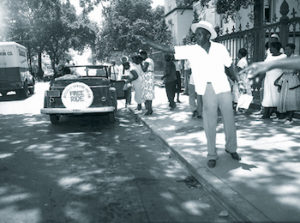
Free Ride Car, Baton Rouge
*On this date in 1953, the Baton Rouge Bus boycott started. This was the first bus boycott in American history by African Americans.
That summer, the black community of Baton Rouge set the tone of the modern civil rights movement. A year before the Supreme Court’s landmark Brown v. Board of Education decision and the protest in Montgomery led by Dr. Martin Luther King, Jr. and Rosa Parks, leaders of the Baton Rouge Black community stood up for racial equality. In March 1953, Black leaders in Baton Rouge successfully had the City Council pass Ordinance 222, which permitted them to be seated on a first-come, first-served basis.
This Ordinance stipulated that Blacks had to sit from the rear to the front and whites from the front to the rear. All the bus drivers were white and refused to accept the Ordinance. They continued to demand that African Americans not occupy front seats reserved for whites. As a result of the bus drivers' noncompliance, the Ordinance was ruled illegal because it conflicted with Louisiana's segregation laws.
The Baton Rouge bus boycott was a response to this. In opposition to this ruling, the Black community began a mass boycott of the buses on this date. The leader of the boycott was Reverend T. J. Jemison, pastor of Mount Zion Baptist, one of the city's largest Black churches. According to Jemison, "The Negro passenger had been molested and insulted and intimidated, and all Negroes at that time were tired of segregation and mistreatment and injustice." The signature innovation of the boycott was the indigenous free-ride network, which was later studied and borrowed by Martin Luther King Jr. during the seminal 1955 boycott in Montgomery, Alabama.
To end the boycott, the white power structure of Baton Rouge agreed to a compromise. It stipulated that the two front seats of buses were to be reserved for whites, and the long rear seat was for Blacks. The remaining seats were to be occupied on a first-come, first-served basis. The Black community agreed to the compromise, and the boycott ended on June 25, 1953.
While the Baton Rouge boycott lasted only two weeks, it set the standards and is growing in recognition as a precedent-setting event in the history of the modern American Civil Rights movement.
The Encyclopedia of African American Heritage
by Susan Altman
Copyright 1997, Facts on File, Inc. New York
ISBN 0-8160-3289-0